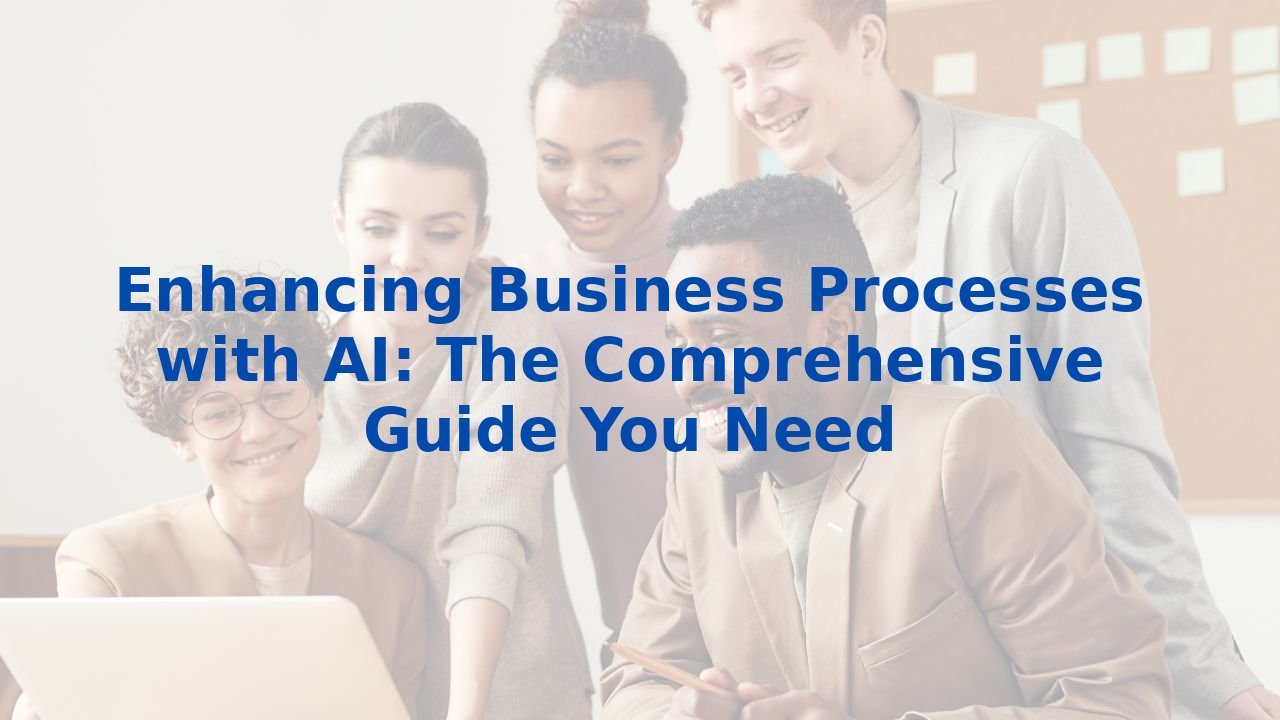Enhancing Business Processes with AI: The Comprehensive Guide You Need
Enhancing Business Processes with AI: A Comprehensive Guide
In a world where time and efficiency are more valuable than ever, businesses are relentlessly seeking innovative ways to optimize operations. Artificial Intelligence (AI) has emerged as a game-changer, offering profound enhancements across numerous business processes. Let's explore how integrating AI can transform your organization and why employee training is essential for harnessing its full potential.
1. Process Discovery and Mapping
Understanding your organization’s processes is foundational to optimizing them. Business Process Management (BPM) thrives on insights generated through process discovery and mapping. AI simplifies this task through process mining, analyzing data from various sources to uncover existing processes, identify patterns, and visualize workflows. This allows businesses to attain a holistic view of operations, illuminating areas ripe for improvement and paving the way for efficiency and enhanced performance.
2. Process Automation
Manual processes often create bottlenecks that hinder productivity. With AI’s ability to automate routine tasks, organizations can liberate employees to engage in higher-value activities. Whether it’s handling data entry, managing documentation, or scheduling appointments, AI not only reduces errors but also allows for a remarkable increase in productivity. Imagine your team focusing their energy on creative and strategic projects instead of mundane tasks!
3. Decision-Making and Predictive Analytics
In today’s fast-paced environment, timely and informed decision-making is critical. AI supports this by rapidly analyzing vast datasets, revealing trends, predicting outcomes, and diagnosing issues. This deeper insight enables organizations to respond proactively to market fluctuations and demand shifts, ultimately leading to more strategic decision-making and improved resource allocation.
4. Customer Service Enhancement
Customer service is paramount for retaining clients and building loyalty. AI elevates this aspect of business by automating responses to simple inquiries and personalizing support through chatbots. Additionally, it can assess the quality of customer service interactions. Such advancements lead not only to enhanced customer satisfaction but also relieve customer service teams of the repetitive workload, allowing them to focus on more complex concerns that require human touch.
5. Product Development and Sales Optimization
When it comes to product development, AI shines through tools like generative design software. These technologies can examine countless designs that meet set criteria, expediting the development phase and conserving resources. Similarly, in the realm of sales, AI streamlines efforts by identifying effective sales channels, suggesting upselling opportunities, and prioritizing leads to optimize overall performance.
6. HR and Recruitment Transformations
The Human Resources department can gain significantly from AI integration. Automation enhances objectivity during salary negotiations, streamlines recruitment processes, and personalizes career pathways for employees. AI-driven platforms facilitate initial candidate assessments, effectively minimizing the time and effort typically required in traditional recruiting methods.
Benefits of AI Integration
Integrating AI into your business processes comes with a slew of benefits:
- Improved Efficiency: Automating routine tasks minimizes manual effort and errors.
- Enhanced Decision-Making: AI offers valuable data-driven insights for better-informed choices.
- Increased Productivity: Employees can shift from repetitive tasks to honorably strategic and innovative endeavors.
- Better Customer Experience: AI tools elevate support quality and responsiveness, significantly boosting customer satisfaction.
The Importance of Employee Training for AI
While the advantages of AI are undeniable, success in its adoption largely hinges on empowering your workforce through training. Here’s why investing in employee education is crucial:
- Understanding AI Capabilities: Employees should grasp what AI can and cannot do, ensuring seamless integration into workflows.
- Data Analysis Skills: Educating your team on data analysis augments the ability to interpret AI-driven insights effectively.
- Adaptability: Training encourages adaptability to new processes and tools, easing transitions to AI-driven operations.
- Ethical Considerations: Raising awareness about AI’s ethical implications ensures alignment with organizational values.
In conclusion, AI stands as a pivotal force in enhancing business processes, driving efficiency, and supporting informed decision-making. With dedication to understanding these benefits and committing to employee training, organizations can tap into the full potential of AI, driving transformation and securing long-term success in an unforgiving marketplace.



